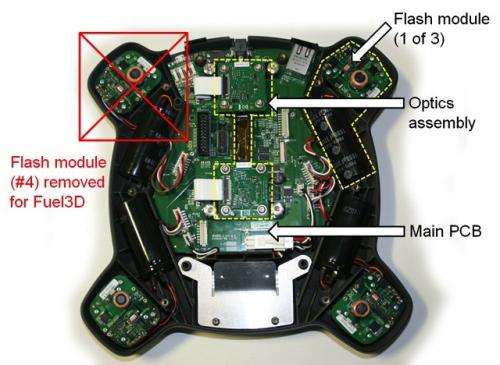August 1, 2013 weblog
Look Ma, no calibration: Handheld 3D scanner points and shoots

The 3D printer market is heating up but the real problem is getting a 3D scanner that can deliver a good template of what you want to print. That is easier said than done. You can get handhelds for a few hundred dollars but pricetags for high-end quality scanners can easily scare off independent artists, engineers and crafts people in search of true 3D geometry and full color and an image capture of highly textured organic and inorganic surfaces. An image capture company with offices in Greenville, North Carolina, and Oxford in the UK, Fuel3D has a product in the works which they want to swing into full production mode. Fuel3D has a working prototype of a handheld full-color 3D scanner for less than $1000.
The scanner is a point-and-shoot device, and, for that price range, offers high-quality images. The company has turned to Kickstarter to raise funds to get the product out. One of their selling points is that no calibration is needed and yet the scanner can achieve a level of color resolution and detail that one would expect from a device with a far higher pricetag. "Today, a buyer could expect to pay over $15,000 for a handheld scanner that provides similar quality results," they said.
According to a Fuel3D technical paper, The Fuel3D system has the following components: The handheld unit that connects a PC or Mac via USB connection; the computer software that works with the scanner; and optical targets, to allow the scanner to track its motion during image capture.
The technology behind this scanner fuses geometric and photometric stereo 3D recovery techniques.
Once a shot is taken on the scanner, raw image data becomes 3D color geometrical data through the company's software, which is included with the scanner, they said. "To run the Fuel3D software, you will need a reasonable specification computer (Mac, Windows 7 or higher, 2GB RAM, dual-core processor),"they added.
Fuel3D was developed by hardware and software engineers and scientists. The scanner technology is based on work that was first developed at Oxford University toward a 3-D medical imaging system. That system was subsequently deployed in UK national health clinics, and medical facilities in the US, France, Denmark, Australia and Afghanistan. Later on, seeing a lack of quality 3D scanning options at affordable prices, a team member recommended working on such a scanner, based on their medical technology.
At the time of this writing, they topped their $75,000 goal with $80,485 pledged and 31 days to go. They were originally offering an early bird pledge price of $750 for beta preproduction units but those are all gone. Pledges of $990 get a full production batch scanner with estimated delivery date of July next year.
More information: www.kickstarter.com/projects/4 … r-for-less-than-1000
© 2013 Phys.org



















